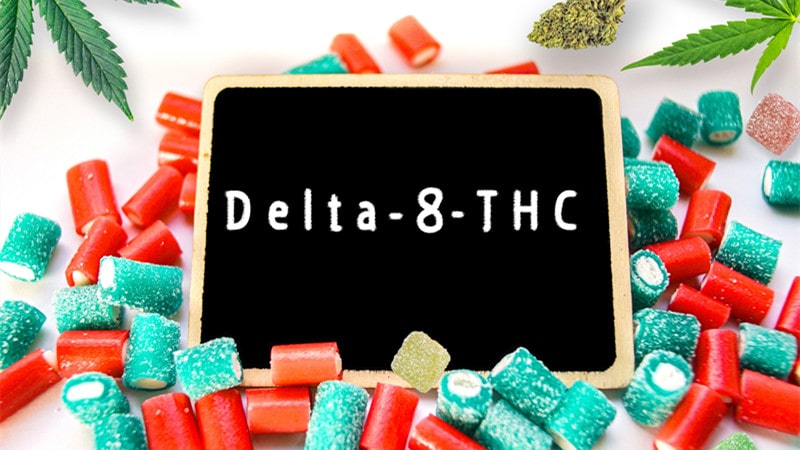The popularity of delta-8 has sparked concern that consumers are being exposed to harmful chemicals. These chemicals can include solid acids and residual solvents used to convert hemp into delta-8 THC. These chemical reactions can be dangerous and lead to poisoning if not handled properly. With regulations in place to ensure the safety of these products, consumers are protected.
Edibles
Delta-8 THC is a popular ingredient in edibles like gummies. People use it to feel calm or happy, but the compound can also cause adverse side effects. These can include dry mouth, red eyes, or the munchies. It’s essential to read labels carefully and start with a small dose, such as half a gummy, to see how it affects you. Edibles can be very potent, and if you’re not careful, you could ingest too much and experience severe symptoms.
If you’re experiencing chest pain, difficulty breathing, or other serious side effects, call 911 or go to the emergency room right away. Because delta-8 is derived from hemp, which is legal to farm at the federal level in the United States, it is easier to buy and sell than delta-9 THC, which is extracted directly from marijuana plants. It may be why consumers have been consuming it more recently.
However, the FDA warns that products containing delta-8 are not safe and shouldn’t be sold for any reason. They are likely made using a clandestine chemical process and may contain harmful additives and byproducts.
They won’t be put through quality and safety testing, which could harm your health. Does delta-8 show up on a drug test? Drug tests may detect delta-8 THC because of its striking similarity to delta-9 THC. It makes it especially important for teens and young adults to avoid delta-8 products.
Vaping
Delta-8 is most often consumed via vaping, a process where cannabis or other cannabinoid products are inhaled through a mouthpiece. Vaping devices come in the form of handheld vaporizers, like e-cigarettes, as well as dab pens, which are used to inhale thicker, more concentrated cannabinoid substances.
Delta-8 liquid is available in various sizes and flavors, including fruity candies. Some gummies that contain delta-8 are advertised as having 10 to 50 milligrams per serving. However, since these products aren’t FDA-regulated, it isn’t easy to know how much of this substance you consume.
Both delta-8 and the delta-9 isomer of THC bind to cannabinoid receptors in your brain, producing mind-altering effects. But delta-8 seems to have a weaker bond with these receptors, and its high is typically less intense than that of delta-9 THC.
Many teens and young adults try delta-8 THC under the impression that it is a healthier alternative to other drugs with more severe side effects. It is also possible that some teens may use delta-8 to self-medicate mental health problems, as they believe it can offer relief from anxiety or depression.
If you suspect your teen is abusing delta-8 or any other drug, it’s essential to seek help immediately. A treatment program for addiction, whether to a substance or an addictive thought pattern, is the best course of action. Depending on the severity of their condition, a teen or young adult may benefit from inpatient or outpatient treatment.
Tinctures
Delta-8 is commonly found in tinctures, a form of cannabis that allows the healing properties of the plant to be easily absorbed into the body. The most popular solvent for tinctures is alcohol, but glycerin and vinegar are also used. Tinctures are often marketed as a safe and natural alternative to medications and can be sold online and in stores that don’t require age verification or identification.
Although the tinctures may have health benefits, they are often made in uncontrolled settings and may contain unsafe contaminants. The dosages can also be unpredictable and vary based on each person’s metabolism. For instance, people with faster metabolisms will experience the effects more quickly than those with slower metabolisms.
People who take tinctures are often seeking to produce euphoric or calming effects or find relief from pain. They might also use them to increase energy and improve their mood. Regardless of the reasons for using delta-8, it’s important to note that it can still be a highly addictive substance.
One runs the risk of becoming dependent on it and experiencing withdrawal symptoms if they use it excessively or stop using it abruptly. Therapy can assist if you or a loved one is abusing delta-8. Inpatient treatment is often recommended, but outpatient treatment can be a good option for teens and young adults who want to maintain their responsibilities, like school or work while getting help for their addiction.
Psychotherapy can be very beneficial for individuals with addictions who wish to comprehend the relationships between their thoughts, feelings, and behaviors.
Safety
As with all cannabinoids, consuming too much Delta-8 can have adverse side effects. Those can include slowed reaction times, loss of coordination, and rapid heart rate. In addition, those using Delta-8 should never drive while under the influence.
Unlike cannabis, which goes through rigorous lab testing, products that contain Delta-8 are often not tested by anyone other than the manufacturer. That’s why it’s essential only to use reputable brands. Look for third-party recognition and a website that features customer reviews.
Additionally, it’s essential to store Delta-8 properly. It would help if you stowed it away in a secure place where children can’t reach it, such as a locked closet. Likewise, if you’re purchasing Delta-8 online, ensure the company uses child-resistant packaging.
While the FDA and CDC warn about the dangers of synthetic THC, it remains popular in states where recreational marijuana is illegal. National poison control centers report an increase in calls about people who unintentionally consume synthetic THC products.
Many cases involve children who unknowingly eat edibles, as the products often appear to be candy or other foods. A healthcare facility had to evaluate the person in over half of these cases. And more than a fifth required admission to the hospital’s critical care unit. Sadly, one of these cases resulted in death.




